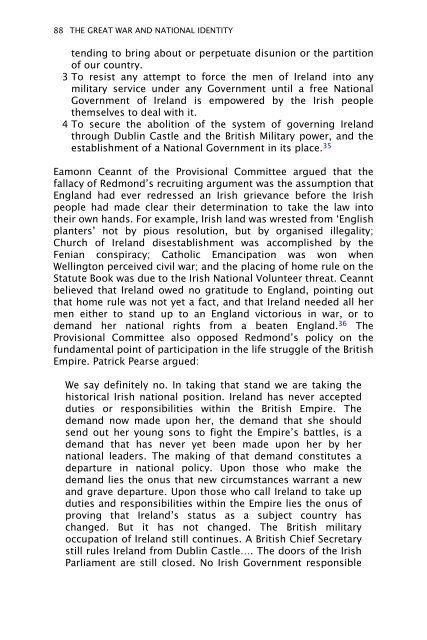Dividing Ireland: World War I and Partition
Dividing Ireland: World War I and Partition
Dividing Ireland: World War I and Partition
You also want an ePaper? Increase the reach of your titles
YUMPU automatically turns print PDFs into web optimized ePapers that Google loves.
88 THE GREAT WAR AND NATIONAL IDENTITY<br />
tending to bring about or perpetuate disunion or the partition<br />
of our country.<br />
3 To resist any attempt to force the men of <strong>Irel<strong>and</strong></strong> into any<br />
military service under any Government until a free National<br />
Government of <strong>Irel<strong>and</strong></strong> is empowered by the Irish people<br />
themselves to deal with it.<br />
4 To secure the abolition of the system of governing <strong>Irel<strong>and</strong></strong><br />
through Dublin Castle <strong>and</strong> the British Military power, <strong>and</strong> the<br />
establishment of a National Government in its place. 35<br />
Eamonn Ceannt of the Provisional Committee argued that the<br />
fallacy of Redmond’s recruiting argument was the assumption that<br />
Engl<strong>and</strong> had ever redressed an Irish grievance before the Irish<br />
people had made clear their determination to take the law into<br />
their own h<strong>and</strong>s. For example, Irish l<strong>and</strong> was wrested from ‘English<br />
planters’ not by pious resolution, but by organised illegality;<br />
Church of <strong>Irel<strong>and</strong></strong> disestablishment was accomplished by the<br />
Fenian conspiracy; Catholic Emancipation was won when<br />
Wellington perceived civil war; <strong>and</strong> the placing of home rule on the<br />
Statute Book was due to the Irish National Volunteer threat. Ceannt<br />
believed that <strong>Irel<strong>and</strong></strong> owed no gratitude to Engl<strong>and</strong>, pointing out<br />
that home rule was not yet a fact, <strong>and</strong> that <strong>Irel<strong>and</strong></strong> needed all her<br />
men either to st<strong>and</strong> up to an Engl<strong>and</strong> victorious in war, or to<br />
dem<strong>and</strong> her national rights from a beaten Engl<strong>and</strong>. 36 The<br />
Provisional Committee also opposed Redmond’s policy on the<br />
fundamental point of participation in the life struggle of the British<br />
Empire. Patrick Pearse argued:<br />
We say definitely no. In taking that st<strong>and</strong> we are taking the<br />
historical Irish national position. <strong>Irel<strong>and</strong></strong> has never accepted<br />
duties or responsibilities within the British Empire. The<br />
dem<strong>and</strong> now made upon her, the dem<strong>and</strong> that she should<br />
send out her young sons to fight the Empire’s battles, is a<br />
dem<strong>and</strong> that has never yet been made upon her by her<br />
national leaders. The making of that dem<strong>and</strong> constitutes a<br />
departure in national policy. Upon those who make the<br />
dem<strong>and</strong> lies the onus that new circumstances warrant a new<br />
<strong>and</strong> grave departure. Upon those who call <strong>Irel<strong>and</strong></strong> to take up<br />
duties <strong>and</strong> responsibilities within the Empire lies the onus of<br />
proving that <strong>Irel<strong>and</strong></strong>’s status as a subject country has<br />
changed. But it has not changed. The British military<br />
occupation of <strong>Irel<strong>and</strong></strong> still continues. A British Chief Secretary<br />
still rules <strong>Irel<strong>and</strong></strong> from Dublin Castle…. The doors of the Irish<br />
Parliament are still closed. No Irish Government responsible








